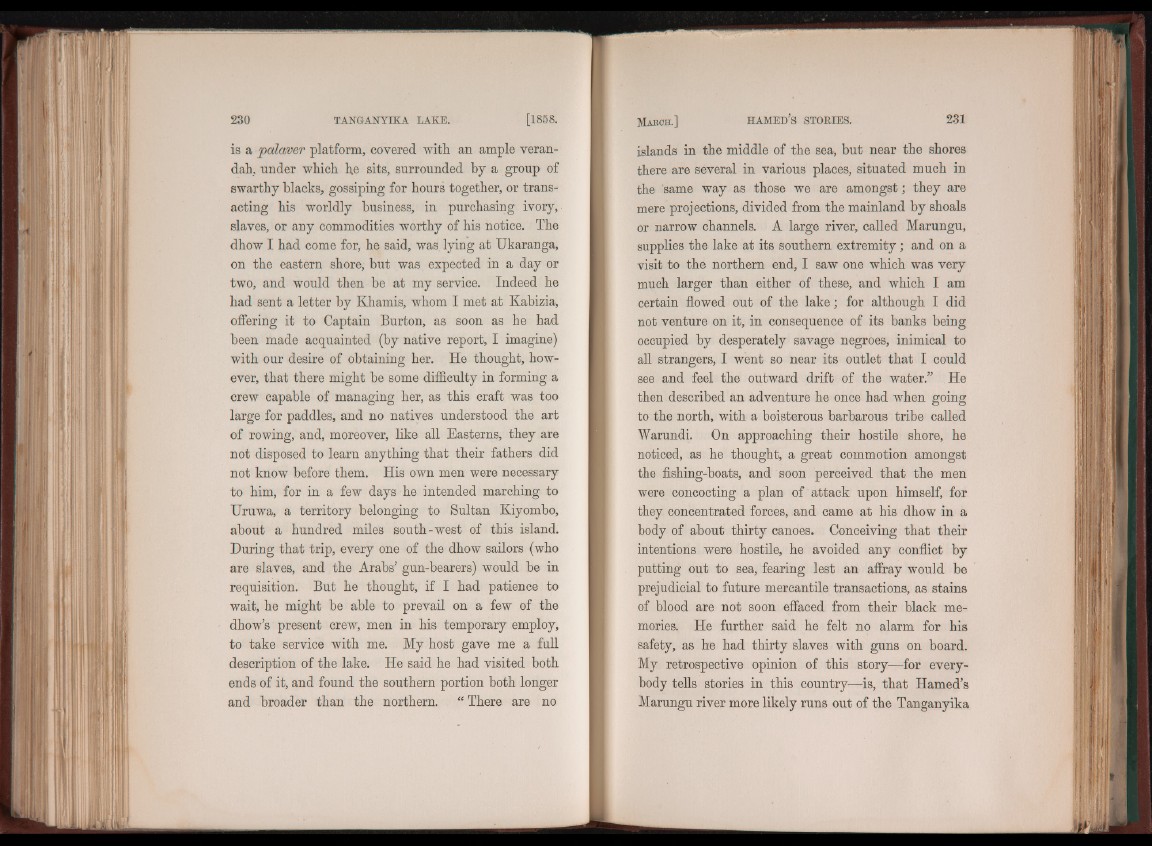
is a palaver platform, covered with an ample verandah,
under which he sits, surrounded by a group of
swarthy blacks, gossiping for hours together, or transacting
his worldly business, in purchasing ivory,
slaves, or any commodities worthy of his notice. The
dhow I had come for, he said, was lying at Ukaranga,
on the eastern shore, but was expected in a day or
two, and would then be at my service. Indeed he
had sent a letter by Khamis, whom I met at Kabizia,
offering it to Captain Burton, as soon as he had
been made acquainted (by native report, I imagine)
with our desire of obtaining her. He thought, however,
that there might be some difficulty in forming a
crew capable of managing her, as this craft was too
large for paddles, and no natives understood the art
of rowing, and, moreover, like all Easterns, they are
not disposed to learn anything that their fathers did
not know before them. His own men were necessary
to him, for in a few days he intended marching to
Uruwa, a territory belonging to Sultan Kiyombo,
about a hundred miles south-west of this island.
During that trip, every one of the dhow sailors (who
are slaves, and the Arabs5 gun-bearers) would be in
requisition. But he thought, if I had patience to
wait, he might be able to prevail on a few of the
dhow's present crew, men in his temporary employ,
to take service with me. My host gave me a full
description of the lake. He said he had visited both
ends of it, and found the southern portion both longer
and broader than the northern. “ There are no
islands in the middle of the sea, but near the shores
there are several in various places, situated much in
the same way as those we are amongst; they are
mere projections, divided from the mainland by shoals
or narrow channels. A large river, called Marungu,
supplies the lake at its southern extremity ; and on a
visit to the northern end, I saw one which was very
much larger than either of these, and which I am
certain flowed out of the lak e ; for although I did
not venture on it, in consequence of its banks being
occupied by desperately savage negroes, inimical to
all strangers, I went so near its outlet that I could
see and feel the outward drift of the water.” He
then described an adventure he once had when going
to the north, with a boisterous barbarous tribe called
Warundi. On approaching their hostile shore, he
noticed, as he thought, a great commotion amongst
the fishing-boats, and soon perceived that the men
were concocting a plan of attack upon himself, for
they concentrated forces, and came at his dhow in a
body of about thirty canoes. Conceiving th a t their
intentions were hostile, he avoided any conflict by
putting out to sea, fearing lest an affray would be
prejudicial to future mercantile transactions, as stains
of blood are not soon effaced from their black memories.
He further said he felt no alarm for his
safety, as he had thirty slaves with guns on board.
My retrospective opinion of this story—for everybody
tells stories in this country—is, that Hamed's
Marungu river more likely runs out of the Tanganyika